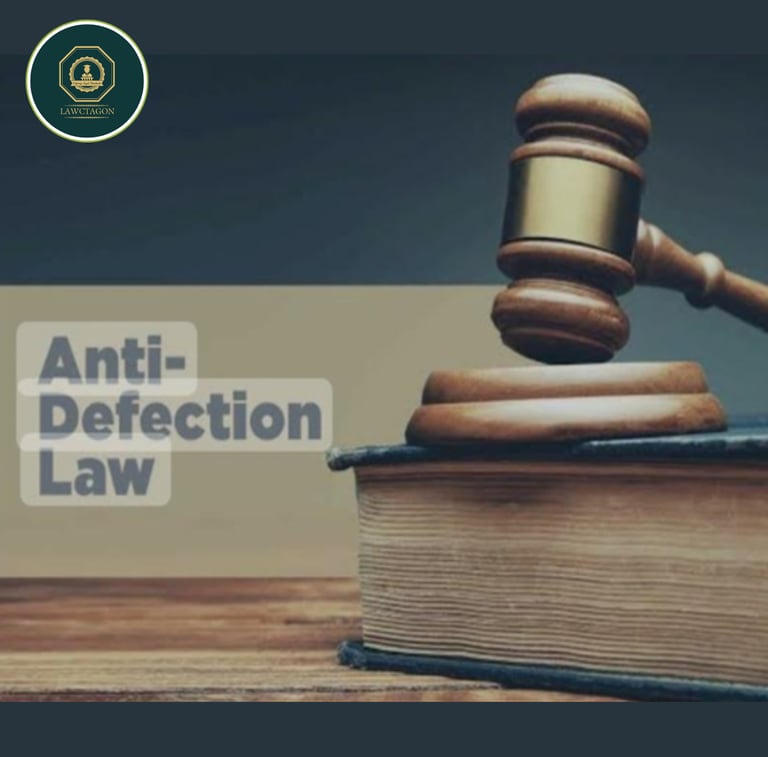Anti Defection Law
This blog discusses the anti-defection law in India, tracing its historical origins, examining its constitutional provisions, and exploring significant related cases. It also highlights the role of the Speaker in defection matters and the impact of the law on the political landscape, including notable incidents like the Maharashtra political crisis.
Bhawna
6/14/20244 min read


Introduction
Defection means when any elected member leaves one party and joins another. This law was introduced by the Rajiv Gandhi government and it was added as the 10th schedule by the 52nd (fifty-second amendment) in the constitution in 1985. The speaker is made adjudicator in defection matters.
History
In 1967, a politician named Gaya Lal from the Haryana Legislative Assembly changed his party thrice in a single day. He was a member of the Indian National Congress but he left his party and joined the United Front. Then he returned to Congress only to join back the United Front once again.
This event made people think seriously about the political defections taking place in the political system. The need for an anti-defection law was felt. This was also the reason why the “Aaya Ram- Gaya Ram” slogan became famous.
Anti-defection Law in Constitution
It is provided under the 10th schedule. Article 102(2) provides for the disqualification of a Member of Parliament (MP) whereas Article 102(2) provides for the disqualification of a Member of the Legislative Assembly (MLA). It provides the following grounds for disqualification- 1) When an elected member voluntarily gives up his membership. 2) If he/she does not vote as per the directions or whip issued by their political party.
[Now you may be wondering what is Whip. When a political party instructs to vote according to its requirement, this instruction is known as issuing a whip.]
3) If any independently elected member joins any party after their election. 4) If a nominated member joins any party after 6 months.
Exceptions
Earlier, when 1/3rd members used to merge with another party, then disqualification could take place. This exception was removed by the 91st amendment and now it requires 2/3rd members to merge with another party. The word split has no place in the Constitution now.
Provision barring of the jurisdiction of courts.
There was a disputed provision under the defection law which gave speaker the absolute power and barred the SC’s judicial review from taking this provision under their jurisdiction. This matter was answered in the Kihoto Hollohon v Zachillu1. It was viewed that para 7 of the 10th schedule contradicts articles 136, 226 and 227 of the Constitution of India and therefore an amendment would be required to be ratified by subclause (2) of article 368 of the Constitution of India. It was held that para 7 of the 10th schedule is unconstitutional. Further, the speaker was given the power to make decisions regarding the disqualification of the members however it was subjected to judicial review.
Role of the speaker in case of Defection
The speaker is given high status under the tenth schedule of the Constitution. It is provided that if the speaker or chairman of parliament or state legislature including the deputy speaker or chairman gives up membership of the political party to which he belongs, and becomes a member of another party in such cases he will not be disqualified under para 5 (a) and (b) of tenth schedule {2}.
In Dr Luis Proto Barbosa v. Union of India, it was held that the Speaker of the Goa Legislative Assembly was disqualified under Article 191(2) in conjunction with paragraph 6(1) proviso of the Tenth Schedule. This disqualification occurred because he resigned from his political party and joined a new political party while still exercising his functions as Speaker of the House. This action did not fall under the exceptions provided in paragraph 5 of the Tenth Schedule.
Cases Related to Anti-Defection Law
Bommai vs union of India 4
It stated that the power of the President to dismiss a government is not valid. The president's power could be used only after the approval of both houses of parliament. It was also held that Article 356 imposition must be the subject of judicial review.
Mayawati’s case
In this case, twelve MLAs from the Bahujan Samaj party voted in favour of Shri Kalyan Singh.There were petitions for disqualifications. But the speaker dismissed it. The respondents contended that the speaker's decision is relevant with subject to the Constitution. It was held that the split in a political party satisfies the need of para 3 of the tenth schedule.
Ravi Naik vs Union of India
It was held that a person may voluntarily give up his membership of political party even though he had not tendered resignation from the party. An inference can be drawn from the conduct of members that they have voluntarily resigned.
Maharashtra political crises
In 2019, the Maharashtra Legislative Assembly election took place, BJP secured 105 seats, Shiv Sena secured 56 seats, congress 44 and NCP 54. Shiv Sena then formed a collision govt. under the name “Maha Vikas Aghadi”. On 21st June 2022, Mr Eknath Shinde went missing along with several Shiv Sena MLAs. The number later turned out to be 40.
On 24th June 2022 Mr Thackeray urged the Deputy Speaker to begin disqualification proceedings against MLAs and Mr. Eknath Shinde. The deputy speaker gave the Shinde faction 2 days to respond to the disqualification notice. Shinde challenged this notice and they were given 12 days to respond. Later the Shinde faction requested the governor of Maharashtra to direct floor test. On the legal front, the Apex court refused to stay the floor test and CM Udhav Thackeray resigned within an hour.
[What is a floor test? This test is used to determine whether the political party is in majority or not in legislative Assemblies, governor or president reviews if the party claiming to form a govt. actually has the required number or not]
Conclusion
The anti-defection law aims to curb political instability by preventing elected members from switching parties for personal gain. While the law has faced challenges, it remains a crucial mechanism to ensure party discipline and uphold democratic integrity.
References
{1} 1992 SCR (1) 686
{2} The Constitution of India, 1950, tenth schedule (para 4 and 5)
{3} 1992 supp (2) SCC 644
{4}1994 AIR 1918,1994 SCC (3) 1
{5} 1994 supp. (2) SCC 641



